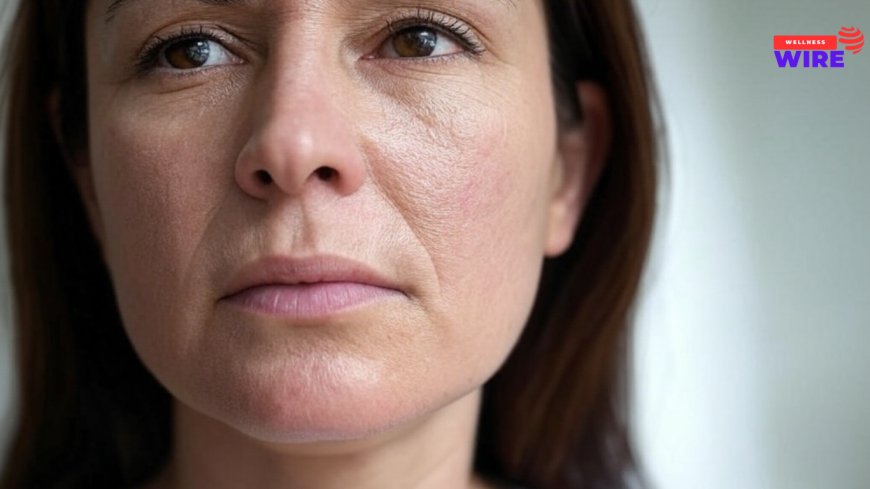How Stress Affects Your Skin & How to Fix It
Stress can cause acne, wrinkles, dryness, and flare-ups. Learn how stress affects your skin and discover expert-backed solutions to fix it naturally.

Introduction
Ever noticed your skin breaking out right before a big event? Or that dull, tired look when you’re under pressure? That’s no coincidence—stress has a profound impact on your skin. Whether it's acne, eczema, premature aging, or excessive dryness, chronic stress can wreak havoc on your complexion.
But why does this happen? And more importantly, how can you fix it? In this article, we’ll explore the science behind stress-induced skin issues and expert-backed solutions to restore your skin’s health.
How Stress Affects Your Skin
Stress isn’t just a mental burden—it triggers a chain reaction in your body, influencing everything from your immune system to hormone levels. The result? A range of skin problems that can be difficult to control.
1. Stress Triggers Acne and Breakouts
When you’re stressed, your body releases cortisol, a hormone that increases oil production in the skin’s sebaceous glands. This excess oil clogs pores, leading to breakouts and blackheads.
- A study published in The Journal of Clinical and Aesthetic Dermatology (source) found that students under academic stress experienced significantly more acne flare-ups compared to those who were relaxed.
- Another study in Archives of Dermatological Research (source) revealed that stress weakens the skin’s ability to heal, making existing acne worse.
Solution:
✅ Wash your face twice daily with a gentle cleanser to remove excess oil.
✅ Use non-comedogenic moisturizers to keep your skin hydrated without clogging pores.
✅ Consider stress-reducing techniques like deep breathing, yoga, or meditation.
2. Stress Accelerates Skin Aging
Chronic stress speeds up collagen breakdown, leading to wrinkles, fine lines, and sagging skin. When cortisol levels remain high, it reduces skin elasticity, making you look older than you actually are.
- A study in Experimental Dermatology (source) found that stress leads to increased oxidative stress, which damages skin cells and accelerates aging.
- Another report in The Journal of Investigative Dermatology (source) highlighted how stress-induced inflammation contributes to premature wrinkles and a loss of skin firmness.
Solution:
✅ Use antioxidant-rich serums (like vitamin C and E) to fight oxidative stress.
✅ Apply sunscreen daily to prevent UV damage, which worsens stress-related aging.
✅ Get enough sleep and hydration—both are essential for collagen production.
3. Stress Causes Dry, Flaky Skin
When your body is under stress, it diverts resources away from the skin to focus on vital organs. This can disrupt the skin’s natural barrier, leading to dehydration and dryness.
- According to The American Academy of Dermatology (source), stress reduces the production of skin lipids, which are responsible for keeping the skin hydrated.
- A study in The International Journal of Molecular Sciences (source) found that stress affects ceramide levels, leading to increased water loss from the skin.
Solution:
✅ Switch to a hydrating cleanser that doesn’t strip natural oils.
✅ Apply a rich moisturizer with ceramides and hyaluronic acid.
✅ Avoid hot showers, which can further dry out the skin.
4. Stress Worsens Eczema, Psoriasis, and Rosacea
Stress triggers inflammatory responses, which can flare up chronic skin conditions like eczema, psoriasis, and rosacea.
- A study in The Journal of the European Academy of Dermatology and Venereology (source) showed that stress increases the severity of eczema symptoms by disrupting the immune system.
- Research from The National Psoriasis Foundation (source) found that stress is a top trigger for psoriasis flare-ups, worsening symptoms like redness and scaling.
Solution:
✅ Avoid harsh soaps and use fragrance-free skincare products.
✅ Apply soothing ingredients like aloe vera, colloidal oatmeal, or niacinamide.
✅ Practice mindfulness or therapy to manage stress-related triggers.
How to Protect Your Skin from Stress
While you can’t eliminate stress entirely, you can take steps to reduce its effects on your skin. Here’s how:
1. Improve Your Diet
Your skin reflects what you eat. Focus on a nutrient-dense diet to combat stress-related skin damage.
- Eat more omega-3 fatty acids (found in salmon, walnuts, and flaxseeds) to reduce inflammation.
- Consume antioxidant-rich foods (like berries, spinach, and dark chocolate) to fight free radicals.
- Stay hydrated—dehydration worsens dry, stressed-out skin.
A study in The American Journal of Clinical Nutrition (source) found that people who consumed higher levels of antioxidants and omega-3s had fewer signs of skin aging and inflammation.
2. Get Enough Sleep
Lack of sleep raises cortisol levels, worsening inflammation, acne, and skin dullness.
- According to The Journal of Sleep Research (source), poor sleep quality is linked to increased signs of aging and slower skin repair.
- Aim for 7-9 hours of quality sleep to help your skin recover overnight.
3. Practice Stress Management
Since stress is the root cause, managing it effectively will naturally improve your skin.
- Try meditation, deep breathing, or journaling to lower cortisol levels.
- Engage in regular exercise—it boosts circulation, delivering more oxygen to the skin.
- Consider professional therapy or counseling if chronic stress is affecting your overall health.
A study in The Journal of Behavioral Medicine (source) found that mindfulness-based stress reduction improves skin conditions like acne and eczema by lowering stress hormones.
Conclusion: The Mind-Skin Connection
Your skin is a reflection of your mental and physical well-being. Stress can lead to breakouts, premature aging, dryness, and inflammatory skin conditions, but with the right approach, you can protect and heal your skin naturally.
By focusing on a balanced diet, hydration, quality sleep, and stress management, you can restore your skin’s glow and resilience—without relying on expensive treatments.
So next time your skin acts up, take a step back and ask: Am I stressed? Your skin might just be trying to tell you something.
What's Your Reaction?
 Like
0
Like
0
 Dislike
0
Dislike
0
 Love
0
Love
0
 Funny
0
Funny
0
 Angry
0
Angry
0
 Sad
0
Sad
0
 Wow
0
Wow
0



















































